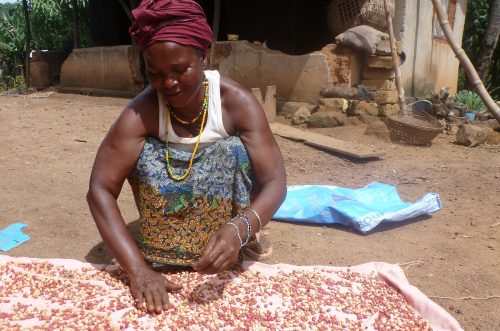Mar 26, 2018 | by Lydia Mbevi

In times of crisis, it can be hard to think about the future, much less make plans for saving money. How could anyone go to a savings group meeting when their village was under quarantine? How could anyone earn money without being able to leave their county or village to trade?
As the regional gender and youth advisor for ACDI/VOCA in Africa, I will be leading a Peer Learning Session at the SEEP Network’s SG2018: The Power of Savings Groups in Kigali, Rwanda, focused on ACDI/VOCA’s experience reviving savings groups devastated by the Ebola outbreak in Sierra Leone. Through our Emergency Food Security Program (EFSP), funded by the United States Agency for International Development, ACDI/VOCA created a cash transfer program in Sierra Leone that targeted Ebola-affected households and provided cash infusions for existing savings groups.
Although the cash transfers came without conditions, the EFSP team used them as an opportunity to spread messages on how to improve their nutrition and livelihoods. We encouraged recipients of the cash transfer program to decide as a household how they would spend the money, allowing them the dignity of controlling their own finances.
Cash transfer programs traditionally offer a short-term response to a crisis, and those who benefit from them typically use the money for pressing needs, such as food, shelter, and medication. We wanted the communities involved in EFSP to be able to invest in their futures and become more resilient and resistant to shocks.
Prior to distributing cash, ACDI/VOCA conducted gender impact assessments to ensure that the transfers did not negatively affect recipients. Information gained from these assessments contributed to design elements in the program that made cash transfers safer and easier for women.
For example, the EFSP team and partners received training on how to identify and respond to sexual exploitation and abuse, resulting in almost no reported cases. We also conducted midterm assessments to ensure that the program benefited both men and women in the targeted communities and that we addressed any adverse effects as soon as they arose. Conducting these assessments before, during, and after the cash transfers allowed the EFSP team to learn and adapt their approach.
Project leaders remained flexible and made numerous adjustments throughout the short life of the program. Through collaboration and learning, the EFSP team contributed to the Cash Learning Partnership in West Africa and shared best practices with other practitioners. Some of these good management practices included working with and continually training community leaders, such as chiefs, to ensure that they supported the program’s messaging to enhance food security.
During the program, we saw that women started borrowing again after their savings groups received cash infusions. At their savings group meetings, women received training on basic literacy and numeracy skills as well as guidance on agricultural enterprises that they could invest in. Meanwhile, community members without access to savings groups were forced to borrow cash from money lenders, who charged up to 50 percent interest, making savings groups a clear pathway out of poverty.
Most savings group members invested in petty trading, hawking small quantities of food, vegetables, and household items. Some even invested in agricultural production and bought inputs or paid workers on their farms.

Kaday Fullah, a widow living in the Makaiba village of northern Sierra Leone, received cash payments through the EFSP project after the Ebola crisis. She used the payments to buy food for her children, settle debts, and get eye surgery to correct her blindness. With her sight returned, Kaday is now a productive member of her community and able to care for her family.
Find out more during my Peer Learning Session, “Using Savings Groups to Promote Resiliency During Times of Crisis,” at SG2018, where I will discuss how to work with existing savings groups to revive economic activities and how to create an enabling environment for businesses disrupted by the Ebola crisis.
Lydia Mbevi is based in Kenya and has 15 years of development experience in agricultural development, humanitarian assistance, and livelihoods. Lydia provides support to projects in Kenya, Uganda, Tanzania, Ethiopia, Zambia, South Sudan, Rwanda, Liberia, Sierra Leone, and the Philippines. Her main role is ensuring ACDI/VOCA’s mandate that using an integrated approach to transform opportunities for men and women is realized in different projects. She also mentors and coaches project gender specialists to ensure that they have skills and tools to provide technical support to their teams. Lydia holds an M.A. in gender and development.
Categories: Microfinance Sub-Saharan Africa Financial Security Health Savings Groups English Savings Groups Blog Blog WebinarsBlogs

1621 North Kent Street, Ste 900,
Arlington, VA, 22209
P 202.534.1400
F 703.276.1433
Website Photos: © mari matsuri
